- Register
- Log in to Tune-In
- Wishlist (0)
-
Shopping cart
(0)
You have no items in your shopping cart.
Beatles News

After Cooper rose to fame himself, he got to know The Beatles. Their breakup was messy and painful for the former bandmates. Lennon and McCartney insulted each other’s music and behavior. Still, Cooper said they never allowed others to speak badly about the band. Lennon would go so far as to try to fight people who insulted McCartney.
“Here’s the thing about them,” he said, per iHeartRadio. “When they were after each other’s throats, when it came to the breakup and all that stuff, if anybody in the Vampires back in those days – that was our drinking club – if anybody said anything bad about Paul, John would take a swing at you, because that was his best friend.”
Source: Emma McKee/cheatsheet.com
details
Paul McCartney is bringing his Got Back tour south of the border.
The two-time Rock & Roll Hall of Famer has just announced a November 14 show at Foro Sol in Mexico City. The concert will be McCartney’s first in Mexico in six years.
A presale on McCartney’s website will begin Tuesday, August 29, with a public on-sale beginning Saturday, September 2.
McCartney is set to kick off the latest leg of his Got Back tour in Australia in October and will then bring the tour to Brazil in November. A complete list of dates, and information on the Mexico City presale, can be found at paulmccartney.com.
Source: kslx.com
details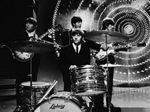
Ringo Starr names his favorite songs of all time. Ringo Starr is a famous drummer who adds unique drum parts to his songs for bands like The Beatles and his solo projects and collaborations. In this article, we will list the 7 songs Ringo Starr named as his favorite.
Ringo Starr, is a rock and roll legend, has left a positive impression on the music industry as The Beatles‘ drummer and through his spectacular solo career. His unique drumming approach was distinguished by its simplicity and precision, making it an ideal companion to the band’s inventive compositions. His outstanding drumming can be heard in classic songs such as “Come Together,” “A Hard Day’s Night,” and “Rain,” where he lent depth and fire to the tunes.
Following the split of The Beatles, Ringo Starr went on a solo career that displayed his abilities as a vocalist, songwriter, and multi-instrumentalist. His singles, including “Photograph,” “It Don’t Come Easy,” and “You’re Sixteen,” showcased his ability to write engaging and accessible songs that grabbed fans.
Source: Yunus Emre/metalshout.com
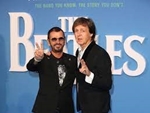
Ringo Starr has unveiled exciting details about his upcoming EP, titled Rewind Forward. Fans of the drummer, singer and songwriter are in for a treat, as the project is set to feature notable contributions from some beloved rockers, including from his former Beatles bandmate, Paul McCartney.
Scheduled to drop on October 13, the EP boasts a short tracklist of four songs. To build anticipation for the set’s release, Starr will share the title track as a single this Friday, August 25.
Among the four tracks, the spotlight shines brightest on the second song, “Feeling The Sunlight,” as it was penned by none other than Paul McCartney himself. This collaboration harks back to their iconic partnership in The Beatles and adds a nostalgic touch to the EP, and it certainly has followers of both musicians, and the band that made them famous, thrilled for a new collaboration of sorts.
Source: Hugh McIntyre/forbes.com
details
Paul McCartney shows no signs of slowing down. He appears ready to head back out on the road once again, and it’s rare that too long a stretch goes by without news of some musical endeavor that he’s undertaking, whether it’s new music or some kind of reissue of older stuff. The guy is not one to stop too long to contemplate his legacy or influence. That’s for the music writers to do, and we’ll be glad to take that on.
Paul didn’t exactly innovate the idea of using the bass guitar as more than just a rhythmic tool. When Music Radar interviewed him in 2017 and cited the way he popularized the bass, he was quick to share the credit: “Yeah, it became a bit more skillful. I wouldn’t personally credit myself, but thanks for that. But I think James Jamerson, him, and me, I’d share the credit there. I was nicking a lot off him.”
Jamerson was the main bassist for The Funk Brothers, the unofficial collective that played on Motown hits. You can hear the similarity between McCartney’s bass on many early Beatles smashes and those early Motown gems with Jamerson providing the bottom end. But McCartney would expand upon that. Listen to his playing on a song like details
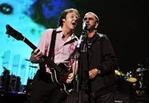
Paul McCartney and Ringo Starr are undoubtedly two of the most iconic and accomplished musicians in the history of the music industry. With their unparalleled contributions to the world of music, it seems they have achieved nearly everything an artist could aspire to. Yet, even after decades of reigning as stars, these legends continue to break records, reach new milestones and etch their names in the annals of music history.
This week, both former members of the iconic band The Beatles achieve a new feat by making their debut appearance on a Billboard chart they have never graced before.
McCartney and Starr earn a noticeable debut on this week's Hot Trending Songs chart, hitting the tally for the first time. They reach the list with their latest rendition of the timeless classic "Let It Be," one of the most cherished songs in the Beatles' repertoire.
Source: Hugh McIntyre/forbes.com
details
A famous producer wanted The Beatles' "I Want to Hold Your Hand" to catch listeners off guard. He discussed what he thought of the final song.
A famous producer wanted The Beatles‘ “I Want to Hold Your Hand” to catch listeners off guard. He discussed what he thought of the final song. In addition, he revealed what he thought of three of The Beatles as people.
George Martin was The Beatles’ regular producer. During a 1995 interview with The Christian Science Monitor, Martin recalled The Beatles introducing him to the music of American rockers such as Chuck Berry, Carl Perkins, Bo Diddley, Buddy Holly, and Jerry Lee Lewis. Their music sounded different from the British music of the era because of the technology they used.
Martin was asked if he could recreate that American sound by importing foreign technology. “No, because it’s not just technology,” he opined. “It’s a combination of the type of song, the type of arrangement, the type of singing, the type of playing, the instruments in the studio, and above all knowing how to use the technology to put it on a disc.”
Source: Matthew Trzcinski/cheatsheet.com
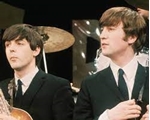
Paul McCartney wanted The Beatles' "Can't Buy Me Love" to start with a certain lyric. The band's producer didn't think that line was impactful.
Paul McCartney wanted The Beatles’ “Can’t Buy Me Love” to start with a certain lyric.
The band’s producer, George Martin, didn’t think that line was impactful.
The Beatles’ “Can’t Buy Me Love” was a hit once in the United States and twice in the United Kingdom.
George Martin said Paul McCartney‘s original version of The Beatles’ “Can’t Buy Me Love” lacked a proper hook. He discussed how a simple musical change made the track more interesting. Subsequently, he revealed what he thought about Paul as a solo artist.
Source: Matthew Trzcinski/cheatsheet.com
details
John Lennon said that one of The Beatles' final albums wasn't fully realized. He shared how he thought this impacted the album's quality.
John Lennon had a problem with more than one Beatles album. He discussed it openly in the studio and, when the band broke up, in interviews. While he didn’t have as much of a problem with Let It Be, he admitted that the album wasn’t quite finished. He didn’t think this was a detriment to the album, though.
By the time The Beatles broke up, their dynamic had chilled considerably. Lennon said that working together was painful.
“It’s torture every time we have to produce anything,” he said, per the book Lennon On Lennon: Conversations With John Lennon. “Any artist, poet, anything, whatever you call yourselves, listening know what it’s like. Well, the Beatles haven’t got any magic you haven’t got. We suffer like hell every time we make anything … And we’ve got each other to contend with. Imagine working with the Beatles, man. It’s a tough scene.”
Source: Emma McKee/cheatsheet.com

Ringo Starr is treating fans to another EP. The two-time Rock & Roll Hall of Famer is set to release his fourth EP, Rewind Forward, on October 13, with the title track dropping Friday, August 25.
“Rewind Forward was something I said out of the blue – it’s just one of those lines like a Hard Days Night. It just came to me. But it doesn’t really make sense,” Ringo says about the title. “I was trying to explain it to myself and the best I can tell you about what it means is: sometimes when you want to go forward you have to go back first.”
Ringo brought in some of his A-list friends to help him with the tracks on the EP, including former Beatles bandmate Paul McCartney, who wrote “Feeling Sunlight.” The EP also features songs written by Toto’s Steve Lukather and Joe Williams, Heartbreakers’ Benmont Tench and Mike Campbell, and Ian Hunter. The Eagles’ Joe Walsh, who is Ringo’s brother-in-law, also appears on the EP.
Source: ABC News/deltaplexnews.com
details
The world's largest and longest-running Beatles festival returns to Liverpool this month.
International Beatleweek will see Fab Four fans from around 40 countries worldwide, including Brazil, Russia, the US, Spain, and the Netherlands, converge on Merseyside for the seven-day event, organised by Cavern City Tours.
Live music will be on all day everyday at the historic Cavern Club and Cavern Pub with 70 bands from over 20 countries taking the stage. The festival will run from August 23 to 29.
International Beatleweek is an annual celebration in Liverpool of John, Paul, George, and Ringo and their rise to being the world's most commercially successful band. Events will be staged across the city including at the Philharmonic Hall, Adelphi Hotel, and the Yoko Ono Lennon Centre.
Highlights include the annual Beatles Convention which has taken place since 1981 and will be at the Adelphi Hotel Hotel on Sunday, August 27. On Monday, there will be an 80th birthday tribute to George Harrison and a celebration of fifty years of Paul McCartney's classic album, Band On The Run.
While you can buy individual tickets to events, packages are also available that include accommodation in hotels across the c details
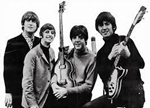
The Beatles are one of the biggest bands in the world, and whether you’re young or old, you’ve probably heard multiple songs of theirs such as Hey Jude. We’re going to test your knowledge and tell you some of The Beatles facts: do you really know the iconic band? When you think of The Beatles, you don’t think of failure or rejection, but they had quite a bit of that in the early days. In particular, Decca Records, a British label, had rejected them in 1962 saying that the guitars that they were using weren’t going to be popular for much longer. Decca passed on them and chose to sign Brian Poole featuring the Tremeloes instead.
Source: Florence Howard/musicgrotto.com
details
Frank Sinatra called 'Something, The Beatles' iconic ballad, "one of the best love songs I believe to be written in the past fifty or a hundred years.". It's widely regarded as one of The Beatles' most beautiful songs.
'Something' featured on The Beatles' 1969 penultimate album Abbey Road, and has captured the imaginations of listeners ever since.
Famously written by George Harrison, he usually had to tussle with John Lennon and Paul McCartney to get his songs included in the band's albums.
Outstanding songs like 'While My Guitar Gently Weeps' and 'Something' couldn't be ignored, because of their sheer quality, becoming fan favourites and instant classics.
Given its romantic nature, it was often thought that Harrison wrote the song about his then-wife Pattie Boyd.
Source: Thomas Curtis-Horsfall/goldradiouk.com
details
The Beatles sparked public outrage when they received MBEs. Here's what former recipients had to say about it when they sent theirs back.
In 1965, all four members of The Beatles received MBEs, or Member of the Most Excellent Order of the British Empire medals. The honor surprised them, but it outraged some members of the public. People were sharply divided on whether The Beatles deserved the award. Former MBE recipients didn’t know what to make of it, either. Some were so upset that they sent their MBEs back in disgust.
When The Beatles received MBEs, people couldn’t believe the musicians got the honor. Papers and media outlets debated whether or not they deserved them, with many outlets covering the story with scorn. Many previous MBE recipients felt the same way. George Read, a member of the Coast Guard, wrote a letter to the palace.
Source: Emma McKee/cheatsheet.com
details
In The Beatles' early career, George Harrison didn't think about writing songs. His bandmates Paul McCartney and John Lennon had that covered. However, eventually, George felt he could write hits that were just as good. He didn't get much encouragement from his bandmates, but once he started writing tunes, he couldn't stop. Whether George could get his songs on The Beatles' albums was a different story.
22. 'Don't Bother Me' – With The Beatles
After realizing he could write songs like John and Paul, George wrote "Don't Bother Me" as an experiment to see if he actually could. It was his first song, so it wasn't the best. George even said it wasn't, but at least he proved he could be just as good as his bandmates.
21. 'You Like Me Too Much' – Help!
"You Like Me Too Much" is one of George's most forgotten Beatles songs. The verses seem like one long run-on sentence and sound as if it's a mouthful to sing. It's melodyless until the brief chorus, which sounds much like the first verse of "I Don't Want To Spoil The Party."
20. 'I Need You' – Help!
"I Need You" is an unimaginative love song. In the mountain of Beatles love songs, it's indistinguishable and unoriginal. G details
